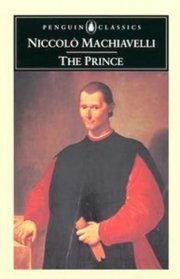Helpful Score: 2
Machiavelli outlines the principles of human nature and personnel management necessary for ordering an entire civilization. While it might not be effective in overtaking contemporary society, and some may find it out-dated, Machiavelli presents challenging dilemmas and arguments for the prospective monarch.
Helpful Score: 2
When people say, "That's very Machiavellian of you," that's not a compliment. This book is harsh and cruel, but remains effective for rule. Basically, whatever it takes to get there, whatever it takes to stay there - no matter what the cost, for the greater good, of course.
I think Machiavelli's heart was in the right place - wanting to create a good life for all, but I question his methods. I don't like people much, either, but I'm not willing to kill them.
I think Machiavelli's heart was in the right place - wanting to create a good life for all, but I question his methods. I don't like people much, either, but I'm not willing to kill them.
Helpful Score: 1
Machiavelli, and his best-known work were and remain deeply misunderstood. It is common to hear Machiavelli's Prince described as being without or above 'ordinary moral of ethical concerns.' This is absolutely an incorrect, and frankly, careless reading of the text.
Yes, Machiavelli says that the Prince cannot afford to place his own personal virtue ethics above the good of the state. However, this is not to say Machiavelli would have the Prince be with immoral, or amoral. Rather, Machiavelli demands that the Prince always put the greater good of the state, and it's people before his own, personal priorities. In every case, he condemns tyranny, needless cruelty, and the pursuit of personal power and wealth in the part of the ruler. He likewise consistently commends the actions of those who place the public good above their own.
Machiavelli's treatise acknowledges the sad fact that, given the failings of human nature, a good ruler may have to do things or act in ways which a good private citizen would not. After all, a private citizen may refrain from killing another individual, but a servant of the state may often have to do just that. Consider soldiers, officers of the law, or employees of corrections facilities where the death penalty is enforced. We do not condemn these individuals because we recognize that they are acting on the behalf of a larger entity, with larger interests. Machiavelli is utterly clear that the Prince is the servant of the state, never the other way around. Therefore, it is incumbent upon the Prince never to shrink from an odious task that is in the best interests of the state. As such, his own personal ethics (which Machiavelli encourages, as long as they do not prevent him from acting in the best interests of the state) must be set aside to allow for a much higher ethical burden.
I do not, however, think this is the best translation of The Prince. I recommend Skinner's translation, in the Cambridge series on political thought.
Yes, Machiavelli says that the Prince cannot afford to place his own personal virtue ethics above the good of the state. However, this is not to say Machiavelli would have the Prince be with immoral, or amoral. Rather, Machiavelli demands that the Prince always put the greater good of the state, and it's people before his own, personal priorities. In every case, he condemns tyranny, needless cruelty, and the pursuit of personal power and wealth in the part of the ruler. He likewise consistently commends the actions of those who place the public good above their own.
Machiavelli's treatise acknowledges the sad fact that, given the failings of human nature, a good ruler may have to do things or act in ways which a good private citizen would not. After all, a private citizen may refrain from killing another individual, but a servant of the state may often have to do just that. Consider soldiers, officers of the law, or employees of corrections facilities where the death penalty is enforced. We do not condemn these individuals because we recognize that they are acting on the behalf of a larger entity, with larger interests. Machiavelli is utterly clear that the Prince is the servant of the state, never the other way around. Therefore, it is incumbent upon the Prince never to shrink from an odious task that is in the best interests of the state. As such, his own personal ethics (which Machiavelli encourages, as long as they do not prevent him from acting in the best interests of the state) must be set aside to allow for a much higher ethical burden.
I do not, however, think this is the best translation of The Prince. I recommend Skinner's translation, in the Cambridge series on political thought.
Helpful Score: 1
Classic and very readable managment/warfare book.
Helpful Score: 1
The classic guide to gaining and keeping absolute power.




